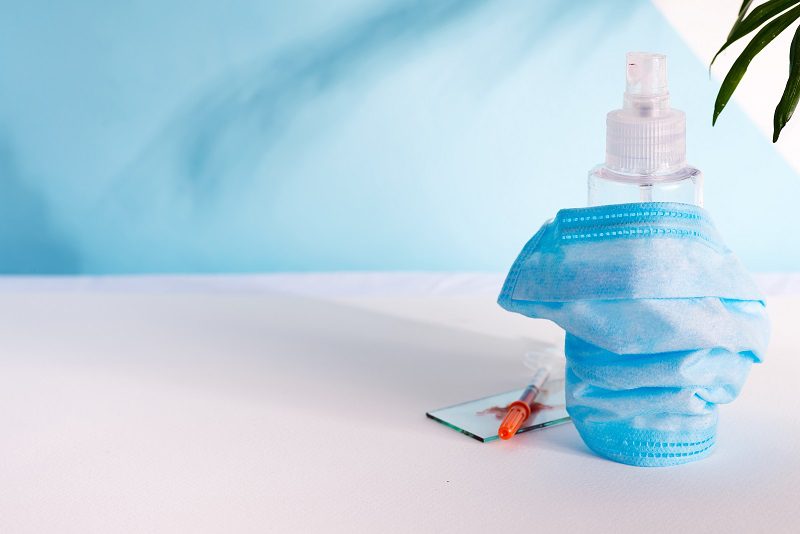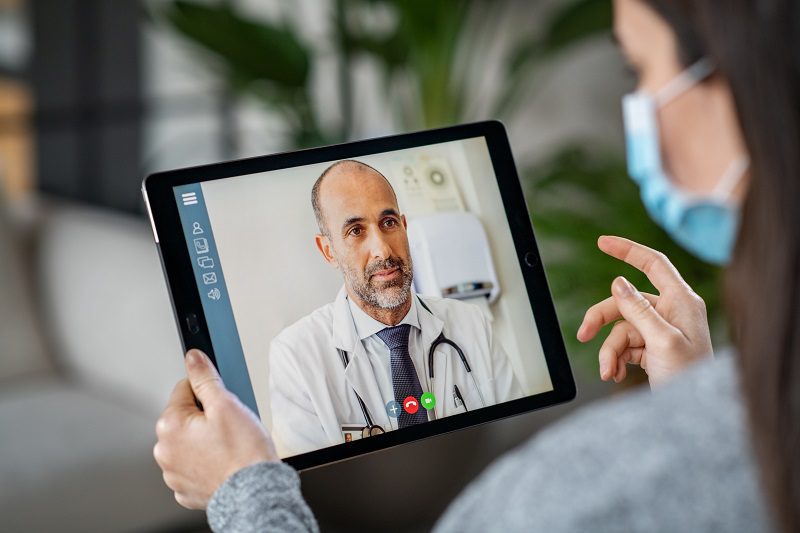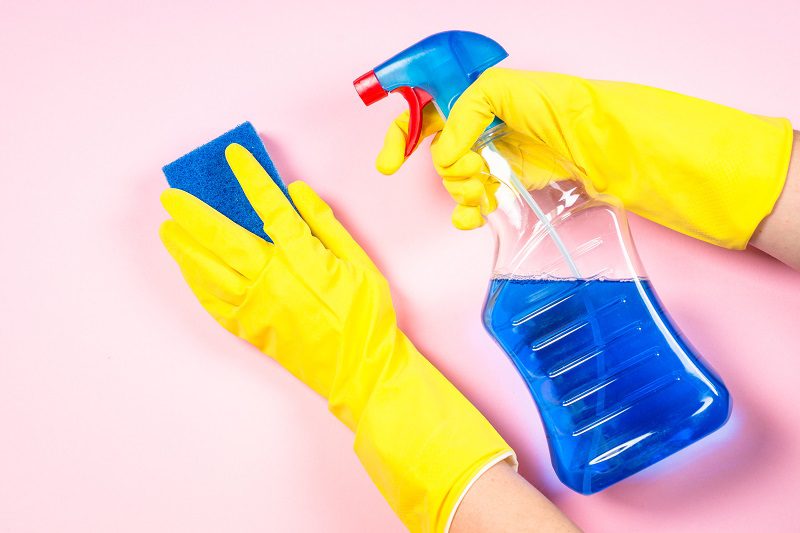
Health experts reveal what you should do if you, a family member, or a roommate is home sick with COVID-19. Read on and find out how to protect yourself and others from coronavirus.
How to stop coronavirus from spreading at home
The U.S. now has more than 160,000 confirmed cases of COVID-19, the disease caused by the new coronavirus. Given glitches with the testing pipeline, many more people are probably already infected and going to get sick, the only thing that’s still unclear it’s just how many.
However, some good news is that 80 percent of people with COVID-19 will have mild symptoms, but for some, it can be fatal. Mild symptoms imply that many of these people will be recovering at home.
Given current social-distancing new rules, followed by some shelter-in-place recommendations, leaves many people to share that same enclosed space with people infected and recovering from COVID-19. For instance, if someone in a household of three has the infection, the other family members or roommates are at risk of getting infected. Additionally, in these conditions, it’s a must to adopt a plan to protect the other people in the home.
Health experts share their tips on how to stop the spread of the COVID-19 in your home if someone is infected. Moreover, it’s important to remember that the new coronavirus can be contagious both before and after you have symptoms.
Set up a “quarantine zone”
Setting up a quarantine zone it’s crucial to be a separate room. It that’s not possible, make sure to keep at least six feet away from the other people in the house, recommends Aaron E. Glatt, MD, a spokesperson for the Infectious Disease Society of America.
The Centers for Disease Control and Prevention (CDC) believes that this virus primarily spreads by respiratory droplets expelled when a person coughs or sneezes. Additionally, coughing is one of the most common symptoms of COVID-19, leaving fever the most common, according to the World Health Organization.
The six feet rule was implemented because it is believed that the respiratory droplets should not travel farther than that. However, it’s crucial that the patient (and the other people in the household) practice good hygiene, like sneezing or coughing into a tissue and then disposing of it.

If possible, high-risk individuals might stay elsewhere
For people at high risk who are not yet infected, it would be ideal to stay at the home of a friend or a family member who isn’t infected, or even at a hotel if it’s possible.
“It’s obviously not ideal, but if you are high-risk, you want to avoid contact with those known to have the illness at all costs,” says Libby Richards, PhD, RN, associate professor at Purdue University School of Nursing in West Lafayette, Indiana.
Nevertheless, if a high-risk person that doesn’t show any symptoms chooses to move into another environment, they should practice extra precautions such as social distancing, washing hands, and wiping counters just in case they are infected and don’t know it, says Richards.
Additionally, it is already known that elderly people are at higher risk for complications if they get COVID-19, and the same goes for people with chronic diseases like heart disease, lung disease, and diabetes, says the CDC.
Don’t take food directly from someone else
You shouldn’t take food items (even if they’re wrapped) as well as plates or containers of food from someone else. The people that are taking care of you at the moment should leave them at your room door if you have one, or at the edge of the designated quarantine zone then back off, says Len Horovitz, MD, a pulmonary specialist with Lenox Hill Hospital in New York City.
Even though the respiratory droplets seem to be the main way in which the new coronavirus is spreading, the CDC also believes the virus can live on surfaces. However, at this point, it isn’t yet known how long the virus can live on inanimate objects, but, says Dr. Glatt, “it can survive for a while so be careful.” If you need help eating, it’s crucial that the person helping you out is wearing a mask, he adds.

Clean surfaces
It’s important to clean and disinfect every surface you touch in and out of the quarantine zone. It is believed that the virus can be infectious on surfaces for at least 24 hours, which is how long norovirus (the long-lasting germ that causes stomach bugs) lasts outside the body, says Dr. Horovitz.
“The biggest areas are bathrooms and kitchens,” Dr. Horovitz adds. “Every surface that’s touched should be cleaned.” That includes the cloth, so make sure to throw the towels and clothes into the washing machine as soon as you finish cleaning. If you don’t own any ready-made products like Lysol wipes or spray, you can dilute two-thirds of a cup of bleach in a gallon of water and you’re good to go.
“It’s a perfectly good antimicrobial,” says Dr. Horovitz. However, the truth is that no one can know for sure how long the virus can last on surfaces which is just another argument for cleaning and disinfecting.
Use a separate bathroom, if possible
It would be ideal to use a separate bathroom if that’s possible. If not, make sure to clean well the space after each visit. These ëxtreme measures” are important because evidence suggests the virus may also spread through fecal matter. A February 2020 study publishing in the journal Gastroenterology found the infectious COVID-19 virus in the stool of 53.4 percent of 73 hospitalized COVID-19 patients.
Additionally, the researchers concluded that diarrhea is also a common symptom of the virus. That means you could easily contract the virus if you come into contact with fecal matter and then touch your mouth.
“The virus can be found in fecal material so try very hard to clean the bathroom,” says Dr. Glatt. “If a patient needs help toileting, both patient and [caregiver] should wear a mask,” adds.
Have designated objects for the patient
“The sick person should get a designated object, like a TV remote or phone that no one else uses,” says Dr. Richards.
Make sure to use only one plate or bowl consistently as well as one set of silverware, plus, these items should be washed individually or sanitized in the dishwasher, she adds.
Also, disposable paper products can also work. Even if the new coronavirus is not the flu, this is flu season as well, so the tips on preventing infection with influenza may work here as well.
The New York State Department of Health recommends using paper towels or towels that can be washed after every use. And avoid sharing bedding, the CDC advises. Don’t play card games or board games with anyone else, says Dr. Horovitz.
Make sure you have one designated caregiver
This applies during flu season and it’s also a piece of good advice now. That caregiver should wear a mask and gloves if available and hand washing is a must, says Dr. Richards.
Make sure that everyone in the household knows and practices strict infection-control measures even if they don’t come near you. These measures include washing your hands with soap and water for at least 20 seconds and use hand sanitizer when you can’t wash your hands. Additionally, another important practice is not touching your face. You may also want to have a designated shopper (not you) to minimize bringing any more virus into the house, says Dr. Richards.

Limit contact with pets and animals
I know this is heartbreaking for many pet owners, but this is just not the time to be cuddling your cat/dog or other animals. The CDC recommends taking the same precautions with animals as you would with people.
Even though there are no reports yet of animals infected by this virus or of animals being able to spread the virus, it’s better to keep your distance just to be sure. The American Medical Veterinary Association recommends having someone else in the household take care of your pet if you’ve contracted the virus. If you have a service dog you have to care for and interact with, make sure to wear a face mask and wash your hands before and after contact.
Think beyond the borders of your home
If you’re sick, the people that live in the same household as you are most at risk, but there’s still the rest of the wide world out there.
This is obvious, but you still need to protect people beyond the borders of your home. So this is definitely not the time to be having dinner parties, or playing card games or board games, says Dr. Horovitz.
You should be monitoring your symptoms while you’re at home. If they seem to worsen day by day, call a hotline or your doctor but don’t just show up to their office or to the hospital. (Many states are setting up coronavirus hotlines, so check your state’s department of health.)
“Telemedicine can prevent hospitals from becoming overwhelmed,” says Edo Paz, MD, lead physician at K Health.























